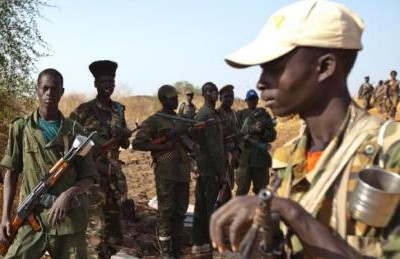South Sudan rival forces withdraw troops from “hot spot areas”
January 29, 2016 (JUBA) – South Sudanese rival forces representing President Salva Kiir’s government and the main armed opposition faction of SPLM-IO, led by former Vice President, Riek Machar, have withdrawn fighters from areas in which they occasionally clashed.

The rival forces, according to a report released by the Centre for Peace and Development Studies at the University of Juba with contributions from civil society organizations, have complied with the terms of the ceasefire, although disengagement, separation and withdrawal of forces from areas in which the forces used to engage in regular clashes were done past the schedules in the peace agreement.
The report noticed some of the allied forces, specifically the Ugandan troops which took side in the conflict and were expected to withdraw within 45 days after the signing of the agreement in August, continued to remain in Juba past the deadline though some relocated to Eastern Equatoria in October.
The Ugandan People’s Defence Forces (UPDF) came to the country after the outbreak of the fighting in December 2013 and was deployed in what the report calls hot spots in Juba and Bor. Others were deployed in Nasito and along Juba-Nimule road, the only tarmacked 225km road between towns in South Sudan.
The report calls for justification for continued presence of some Ugandan forces in Juba.
“IGAD has to justify and inform the general public about the presence of the UPDF elements in the South Sudan capital, Juba, because the UPDF are part of the forces tracking the Lord’s Resistance Army leader in Western Equatoria state,” the report released on Thursday reads in part.
The IGAD monitors, it added, should visit locations in which elements of the Ugandan forces have continued to occupy in and around Juba and report on any movements or presence of armed groups.
The verification of the existence of elements of Ugandan troops, according to the report, should be done within the next 30 days. Eight civil society organizations and religious groups contributed to the report.
Neither army nor the armed opposition leadership was able to comment on the release, specifically the continued presence of elements of the units of the Ugandan forces in strategic locations in the country.
South Sudan’s armed opposition leader, Riek Machar, visited Kampala on Monday and held talks with President Yoweri Museveni. It was not however clear whether the two leaders tackled the continued presence of the UPDF in South Sudan.
(ST)
